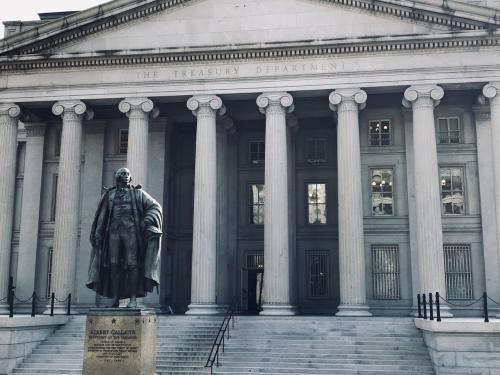Dan Tarullo, Nomura Professor of International Financial Regulatory Practice at Harvard Law School and a nonresident fellow at the Hutchins Center at Brookings, was the Federal Reserve Board’s point person on bank supervision and regulation from 2009 to 2017, including during the implementation of the Dodd-Frank Act. I talked with him at the end of July 2023 to get his take on recent developments in the banking business, including the government’s evolving approach to mergers, proposals to lift the minimum capital requirement on banks, and more.
Here are some highlights from the conversation. You can read the full transcript here.
On bank mergers
Mid-size regional banks, Tarullo said, are at risk of being squeezed if they face, as is likely, more stringent regulatory requirements at a time at which they don’t have great growth or profitability prospects. Particularly if they lose talent, these banks will lose market share. “I suspect that some of the business that they can’t retain or win will be captured by the G-SIBs [global systemically important banks],” Tarullo said. That could lessen the competition in the industry.
The risk is that this dynamic coupled with growing skepticism about bank mergers from antitrust authorities could lessen competition in the banking business. Although Tarullo endorsed several elements of new merger guidelines spelled out recently by Assistant Attorney General Jonathan Kanter, the Justice Department, and the Federal Trade Commission, he expressed concern that the new approach fails to recognize the changing dynamics of the banking industry. It may create hurdles for mid-size regional banks that seek to merge or be acquired by one of the four super-regionals (U.S. Bancorp, Truist, PNC Services, and Capital One). A world in which there are the four G-SIBs (JP Morgan, Bank of America, Citi, Wells Fargo) and eight super-regionals could increase the odds of real competition in local markets, he said. “This is the kind of assessment that the agencies and the Justice Department need to be making. To date, I haven’t seen the evidence that they’re doing so,” said.
On bank capital
Tarullo favors lifting the minimum capital requirements on G-SIBs and super-regional banks, as the Fed is proposing and big banks are fighting. In setting capital requirements, there is a trade-off between banks’ capacity to lend (lower capital requirements) and banks’ safety, soundness, and resilience (high capital requirements). The weight of the academic evidence, he said, favors some increase from current minimum capital requirements.
Tarullo expressed skepticism that the government would, at a time of financial stress, invoke Title II of Dodd-Frank, which outlines a way for the government to take over a failing bank without taxpayer money. As a result, he advocates bolstering the resiliency and recovery capacity of the big banks by fattening their capital cushions so they are less likely to fail.
Big banks today must hold enough capital to pass the stress tests that have been administered by bank regulators since 2009. The intent was to make sure banks’ capital cushions are large enough for them to survive an adverse economic scenario devised by the Fed. But Tarullo said that the stress tests may have outlived their usefulness for setting capital requirements because they have become more predictable, and banks have figured out how to tailor their balance sheets to “pass” the tests. That, he said, argues for relying more heavily on point-in-time capital requirements for big banks and making them higher.
Tarullo cautioned against substantially lifting capital requirements on banks below the super-regionals threshold. To do so, he said, could intensify the competitive challenges those banks already face.
On supervision
The Federal Reserve, in its internal review of the failure of Silicon Valley Bank, has acknowledged failures of supervision. Tarullo warned against relying too heavily on supervision for three reasons. One, the relative intensity and focus of supervision is opaque to the rest of the world and can be dialed up or down at the discretion of top officials. Two, supervision is hard to do well. There are a limited set of supervisors with the knowledge, intellectual acumen, and experience to identify and pursue issues at big and complicated banks. Three, supervision sits on top of regulation. When regulation didn’t adjust for the increasing tendency of uninsured bank deposits to run very rapidly, neither did supervision.
On partisanship in bank regulation
Before and even during the Global Financial Crisis of 2007-09, views of members of Congress on bank regulation didn’t always coincide with party affiliation. Some Republicans, particularly from rural states in the South and the Mountain states, were worried about the threat to community banks from big money-center banks. And some Democrats from states with big banks were often sympathetic to their arguments. That changed in about 2010. When Democrats favor something, Republicans reflexively oppose it, and vice versa. And the dominant Republican view is to be skeptical of regulation; in the past, Republican opinion was more mixed.
The prospect of pendulum swings in bank regulation every time the White House changes hands makes it hard for bank executives to plan. “You would think that the biggest banks might argue for regulation somewhat stronger than they would like over time in return for not having so much whipsawing of regulation,” he said. He said he suspects senior bank managers agree, but that trade associations thrive on controversy and conflict with regulators.
On deposit insurance
Tarullo said he doubts Congress will enact substantial reform of the deposit insurance system. He does not favor eliminating the cap on deposit insurance (now $250,000 per account) because it could lead zombie banks, no matter how troubled, to attract deposits. Instead, he called for using other levers to address the problems that recent bank failures exposed. That includes using regulation to prevent banks from having as much as 90% of their deposits in uninsured accounts. Given the now-evident speed at which deposits can run electronically in a social media-fueled frenzy, one option would be to make holding ever-larger shares of uninsured deposits more costly to the banks. “We need to ask to what degree uninsured deposits have been funding lending, and to what degree they just get turned over into bond holdings? If it’s predominantly the latter, as at some data suggest, then … there would be no better argument for banks taking customer deposits to invest in Treasuries or agency securities than there is for Fidelity and Vanguard to do so in their mutual funds.”
-
Acknowledgements and disclosures
The Brookings Institution is financed through the support of a diverse array of foundations, corporations, governments, individuals, as well as an endowment. A list of donors can be found in our annual reports published online here. The findings, interpretations, and conclusions in this report are solely those of its author(s) and are not influenced by any donation.
The Brookings Institution is committed to quality, independence, and impact.
We are supported by a diverse array of funders. In line with our values and policies, each Brookings publication represents the sole views of its author(s).





Commentary
Op-edTalking to Dan Tarullo about bank mergers, stress tests, and supervision
August 10, 2023